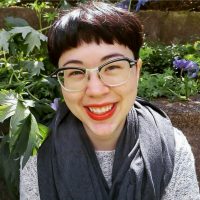Yvette Rancourt

Master of Archival Studies and Library and Information Studies
What were Yvette’s main responsibilities?
Yvette ran the Bamfield Marine Science Centre library by herself, and so her position involved an array of library duties—circulation, collection development, and cataloguing—as well as responsibilities related to the centre’s research and learning activities, including instructing classes on databases and formatting, and leading workshops on research data management. “I’m often on the lookout for new projects or ways to improve existing practices,” she said. Yvette even wrote library policies and collected information to help develop a disaster recovery plan in the event of an earthquake or other natural disaster.
What did Yvette accomplish?
In addition to cataloguing over 300 documents and assessing over 17 boxes of special collections material, Yvette also developed an Open Science Framework pilot project, which she designed for use in the centre’s fieldwork courses. Yvette had learned about open research concepts through coursework and conferences before arriving at Bamfield. Yet, after working with students, instructors, researchers, and their data, she began to see the gaps between the theory of Open Access and its practice. She’s excited to continue working on OA projects as her career develops.
Is there a connection between her studies and this position?
Yvette describes her co-op experience at Bamfield as concretizing her academic coursework, saying that it “allowed me to expand on some of the concepts I’ve studied in class and to connect them to real-world projects and initiatives.” Her work in the Bamfield library will be an asset if she pursues a career in science or academic librarianship, because it has enhanced her experience with research data and information management.
How will this experience in Bamfield benefit Yvette after graduation?
Over the course of her undergraduate and graduate studies, Yvette has held six different co-op jobs, which have given her the chance to experience a little bit of everything. She sees co-op’s “practical experience” as a way “to really focus on your interests,” in a way that course schedules and timetables may not enable. Because of her experience at Bamfield, and in co-op work more generally, Yvette feels confident about her ability to describe her skills and experience: she can point to “real-life examples and projects to demonstrate what I can do.”
Yvette Rancourt



Master of Archival Studies and Library and Information Studies
What were Yvette’s main responsibilities?
Yvette ran the Bamfield Marine Science Centre library by herself, and so her position involved an array of library duties—circulation, collection development, and cataloguing—as well as responsibilities related to the centre’s research and learning activities, including instructing classes on databases and formatting, and leading workshops on research data management. “I’m often on the lookout for new projects or ways to improve existing practices,” she said. Yvette even wrote library policies and collected information to help develop a disaster recovery plan in the event of an earthquake or other natural disaster.
What did Yvette accomplish?
In addition to cataloguing over 300 documents and assessing over 17 boxes of special collections material, Yvette also developed an Open Science Framework pilot project, which she designed for use in the centre’s fieldwork courses. Yvette had learned about open research concepts through coursework and conferences before arriving at Bamfield. Yet, after working with students, instructors, researchers, and their data, she began to see the gaps between the theory of Open Access and its practice. She’s excited to continue working on OA projects as her career develops.
Is there a connection between her studies and this position?
Yvette describes her co-op experience at Bamfield as concretizing her academic coursework, saying that it “allowed me to expand on some of the concepts I’ve studied in class and to connect them to real-world projects and initiatives.” Her work in the Bamfield library will be an asset if she pursues a career in science or academic librarianship, because it has enhanced her experience with research data and information management.
How will this experience in Bamfield benefit Yvette after graduation?
Over the course of her undergraduate and graduate studies, Yvette has held six different co-op jobs, which have given her the chance to experience a little bit of everything. She sees co-op’s “practical experience” as a way “to really focus on your interests,” in a way that course schedules and timetables may not enable. Because of her experience at Bamfield, and in co-op work more generally, Yvette feels confident about her ability to describe her skills and experience: she can point to “real-life examples and projects to demonstrate what I can do.”